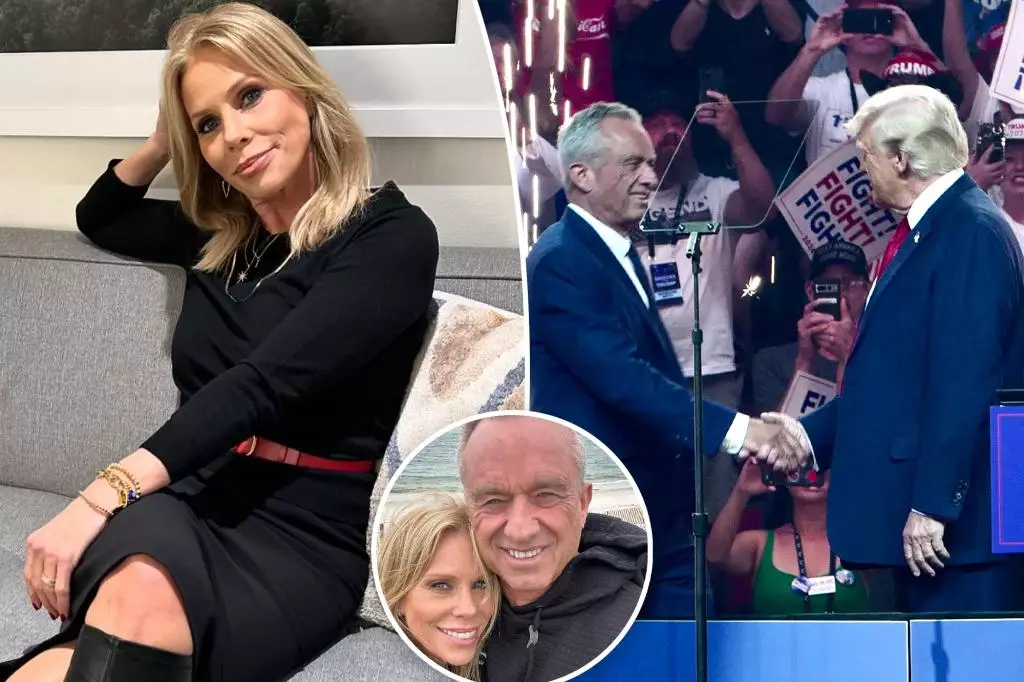The relationship between Cheryl Hines and Robert F. Kennedy Jr. has hit turbulence, with rumors circulating about a potential divorce stemming not solely from infidelity but significantly influenced by political alignment and public perception. Reports suggest that Hines, a staunch Democrat, finds herself increasingly at odds with Kennedy’s recent political affiliations as he steps into the contentious terrain of Donald Trump’s MAGA movement. This evolving dynamic raises essential questions about the intertwining of personal and political life, especially in the context of high-profile relationships.
Cheryl Hines’ discontent appears to stem primarily from Kennedy’s dramatic political pivot. When Hines married Kennedy—a member of the storied Kennedy family, known for its Democratic legacy—her expectations likely included a shared political ideology. Instead, her husband’s endorsement of Trump has placed her in an uncomfortable position, amplifying her frustrations and feelings of betrayal. For many, politics is an intensely personal matter. Aligning oneself with a figure as polarizing as Trump can create rifts not just in public opinion but also in personal relationships, as seen with Hines.
Kennedy’s endorsement of Trump reportedly came after discussions about a potential cabinet position should Trump secure another term in office. Such motivations foster suspicion and disillusionment. Hines is understood to be more upset about this political endorsement than Kennedy’s reported affair with New York Magazine writer Olivia Nuzzi. This scenario illustrates a broader issue where personal sacrifices and ideology clash within intimate partnerships.
The Scandal That Rocked Their Union
Lurking within the shadows of the political fallout is a scandal involving Nuzzi, which has added a layer of complexity to the couple’s precarious relationship. Reports of flirtation began with Nuzzi writing a profile on Kennedy, which subsequently escalated into private exchanges that included intimate conversations. The term “love bombing” has even surfaced in discussing their interactions, and the media frenzy surrounding this affair depicts a very public disintegration of trust within Hines and Kennedy’s marriage.
Sources allege that Hines was left blindsided by the affair, generating feelings of embarrassment and anger. The juxtaposition of a long-standing legacy bound to womanizing behavior and the modern-day implications of a highly public affair paints a troubling portrait of emotional betrayal. Despite Hines’s prior awareness of Kennedy’s history, the expectation was likely that the couple had moved past such trappings into a more stable life together.
The implications of being married to a high-profile figure entwined in political scandal are manifold. Hines has faced scrutiny not only for her marriage but also for her political stance, causing even factions within Trump’s circle to express animosity toward her. Some reportedly hope the turmoil between Hines and Kennedy results in separation, as they view it detrimental to Kennedy’s political ambitions. In this atmosphere of divisiveness, Hines stands as a figure caught between loyalty to her husband and her values.
Kennedy himself has attempted to articulate the complexity of his wife’s position in light of his political maneuvers. He admitted that Hines was uncomfortable with the endorsement, acknowledging the dissonance it created. This candidness, however, does little to mitigate the damage done. Personal relationships, particularly in the public sphere, require a balancing act between private affection and external pressures, a balance that seems to have been upset drastically in this case.
As the dust settles on this scandal, questions loom about the future of Hines and Kennedy. Initial sightings of Hines without her wedding ring in Milan prompted speculation about a split, followed by efforts to make appearances with her ring, signaling the internal struggle with her marital commitment. It’s indicative of a woman grappling with significant personal and public dilemmas.
The couple’s relationship highlights a broader conversation about loyalty, identity, and the crossover between public personae and private lives. In a world where political loyalty can define personal relationships, Hines finds herself at a critical crossroads. Will she continue navigating the complexities of marriage with a figure whose political views clash with her own, or will she take the path toward independence? As events unfold, the narrative continues to serve as a reminder of the intricate relationship between love, politics, and personal integrity.
The saga of Hines and Kennedy reveals a complex tapestry woven from threads of love, betrayal, political allegiance, and public scrutiny—serving as a cautionary tale about the delicate balances maintained within high-stakes relationships. As both navigate the fallout from their union, their story resonates profoundly in today’s politically charged climate.


Leave a Reply